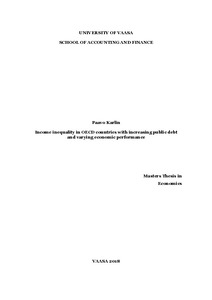Income inequality in OECD countries with increasing public debt and varying economic performance
Karlin, Paavo (2018)
Kuvaus
Opinnäytetyö kokotekstinä PDF-muodossa.
Tiivistelmä
This master’s thesis focuses on changes in income inequality in OECD countries
and how this has changed depending on public indebtedness and economic
performance. Increase in public debt levels has happened simultaneously with
the increase in income inequality since 1980’s. However, the theoretical and
empirical models related to these issues have shown remarkable divergence in
results. This thesis analyses disposable income and market inequality Gini
coefficients in OECD countries and it is related to domestic and external
indeptedness of public sector and growth.
This thesis provides evidence that domestic and external debt have dissimilar
effects to income inequality with public finance from external debt improving
equality although plausible harmful for economic growth. Increasing
indebtedness has thus been associated with lower disposable income inequality
although market inequality has grown. These results indicate the complicated
way that domestic and external debt relates to economic behaviour.
Introduction to the subject is provided in chapter 1. Chapter 2 provides
background and broader history to economic inequality. Chapter 3 discusses
differences between income and wealth inequality. Chapter 4 deals with
historical development of inequality. Chapter 5 provides theories regarding
inequality. Chapter 6 is similar but regarding public debt. Chapter 7 deals with
previously done research and hypotheses. And in chapter 8 a regression analysis
is used to analyze the effect of public debt to income inequality and their
combined effect on economic performance. Final chapter summarizes
conclusions and provides further research ideas.
and how this has changed depending on public indebtedness and economic
performance. Increase in public debt levels has happened simultaneously with
the increase in income inequality since 1980’s. However, the theoretical and
empirical models related to these issues have shown remarkable divergence in
results. This thesis analyses disposable income and market inequality Gini
coefficients in OECD countries and it is related to domestic and external
indeptedness of public sector and growth.
This thesis provides evidence that domestic and external debt have dissimilar
effects to income inequality with public finance from external debt improving
equality although plausible harmful for economic growth. Increasing
indebtedness has thus been associated with lower disposable income inequality
although market inequality has grown. These results indicate the complicated
way that domestic and external debt relates to economic behaviour.
Introduction to the subject is provided in chapter 1. Chapter 2 provides
background and broader history to economic inequality. Chapter 3 discusses
differences between income and wealth inequality. Chapter 4 deals with
historical development of inequality. Chapter 5 provides theories regarding
inequality. Chapter 6 is similar but regarding public debt. Chapter 7 deals with
previously done research and hypotheses. And in chapter 8 a regression analysis
is used to analyze the effect of public debt to income inequality and their
combined effect on economic performance. Final chapter summarizes
conclusions and provides further research ideas.
